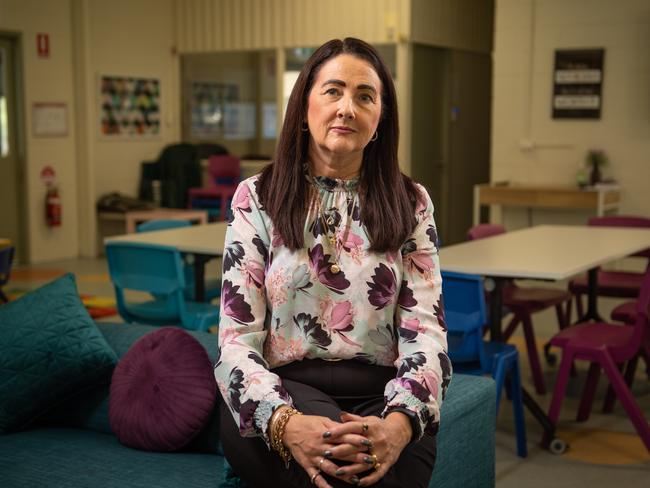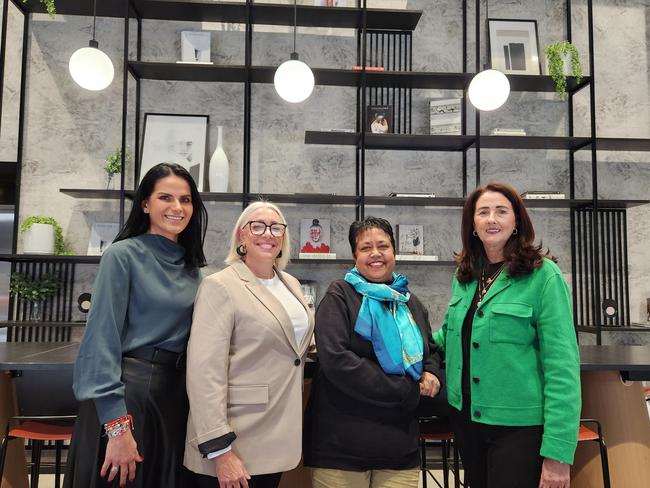Increased DV calls a sign of nationwide recognition of gender-based violence
Reports of gender-based violence are becoming more prevalent in our communities, with Queensland Police and a DFV prevention advocate revealing why.
Warwick
Don't miss out on the headlines from Warwick. Followed categories will be added to My News.
A former South East Queensland teacher never imagined a life outside of education after 36 years in the industry.
It was her daughter’s harrowing experience of domestic violence that would come to change the life of Beyond DV founder Carolyn Robinson and her family forever.
For the past six years Mrs Robinson and her team have worked tirelessly to provide women, children and even perpetrators accessing their service with holistic recovery support.
“I never thought that I’d be running a charity, that wasn’t in my life plan, I’ve been a teacher for 36 years,” she said.
ROAD TO RECOVERY AND HEALING
On June 11 an integral step in our nation’s plan to end violence against women and children saw the first-ever roundtable into healing and recovering from domestic, family and sexual violence.
As the Alliance’s chair, Mrs Robinson attended along with 12 other Queensland sector representatives among the four pillars; housing, health, justice, children and young people, and economic recovery.

“We had a very clear agenda for that day, we wanted to talk about what is happening in the sector around recovery and healing across Australia, because not a lot of us know what each other are doing,” she said.
“But we also wanted to identify the barriers that are still existing for women and children to get the support they need.
“Recovery and healing if done well, if provided for as long as needed, is actually a critical form of prevention of future violence.”
Mrs Robinson said a significant barrier for women in their recovery is the long-term trauma, stress and anxiety of going through family court.
“We have women spending hundreds and hundreds of thousands of dollars on legal fees and some of these women are having to raid their super (or) take out big loans,” she said.
Although access to affordable and secure housing is difficult nationwide, for victims domestic violence who once lived in their own home and have no rental history, it’s felt tenfold.
For women who have endured financial abuse, a lack of economic security is a challenge that can leave many feeling disheartened.
“We really have to focus on how can we improve their financial situation so that they can create goals for themselves, but they actually have the capacity to achieve them,” Mrs Robinson said.
When a woman is impacted by violence, the exposure also extends to her children, with recovery support and programs for children and young people nationwide few and far.
“The needs of children and young people change over time and we have to make sure that we’ve got recovery programs and services that meet those needs at every step of their lives,” Mrs Robinson said.
“Because they’re the most vulnerable group of all when we’re talking about intergenerational violence.”

Further data obtained from Queensland Police on the rates of domestic and family violence experienced across southwest Queensland reveal more women and children in these areas are acknowledging what’s happening behind closed doors.
A QPS spokesman said the service was working to bring greater awareness to the plight of DFV, along with confidence for victims to report their abuse.
“In July 2021, the QPS implemented a decision to enhance the consistent practice of recording criminal offences associated with DFV investigations across the state within the QPRIME computer system,” the spokesman said.
“When investigating a DFV occurrence, police across the state are now consistently recording all offences identified in the same incident in the QPRIME system.
“It does not necessarily mean that more offences are occurring, but rather the QPS is more
accurately capturing the true baseline of DFV criminal offending as reported by members of the public to police.”
The QPS data revealed between January and April 2024 police in the Darling Downs district received more than 3000 DV related calls for help.

In the Southern district, police received more than 8000 calls in the same period.
While the message that gender-based violence is unacceptable has begun to resonate nationwide, there remains a greater safety concern for those addressing the issue head on.
“We have to make sure that people understand that even with those very subtle unhealthy behaviours like checking a phone or stopping you from going out with friends, there’s a strong element of risk in trying to solve that yourself,” Mrs Robinson said.
“Those relationships actually have a higher likelihood of homicide than those that have physical violence.
“We really need to reiterate to anybody who feels that they’re in an unhealthy relationship, once you recognise that ring 1800 RESPECT, ring DV Connect and tell them what you’re witnessing, what you’re experiencing and get some advice around a safe way to manage that.”
For Mrs Robinson, continuous community engagement and education in recognising the different forms of abuse and where to get help, including driving home the message of safety and equality, is how we move towards a future without violence.
“The behaviours that ultimately lead to domestic and family violence centre around the lack of respect, the lack of gender equality,” she said.
“Not all gender inequality is going to lead to violence, but all violence stems from gender inequality.”
Mrs Robinson said she’s hopeful as more young people recognise the signs of unhealthy relationships, it will encourage other young men to call out this behaviour.
“That’s where it really needs to start, women aren’t going to be able to solve this,” she said.
“Men are going to have a higher likelihood of listening to the messages from other men.”
In a new phase of the ‘Stop it at the Start’ campaign, the Albanese government this week rolled out the ‘Hidden Trends of Disrespect’.




